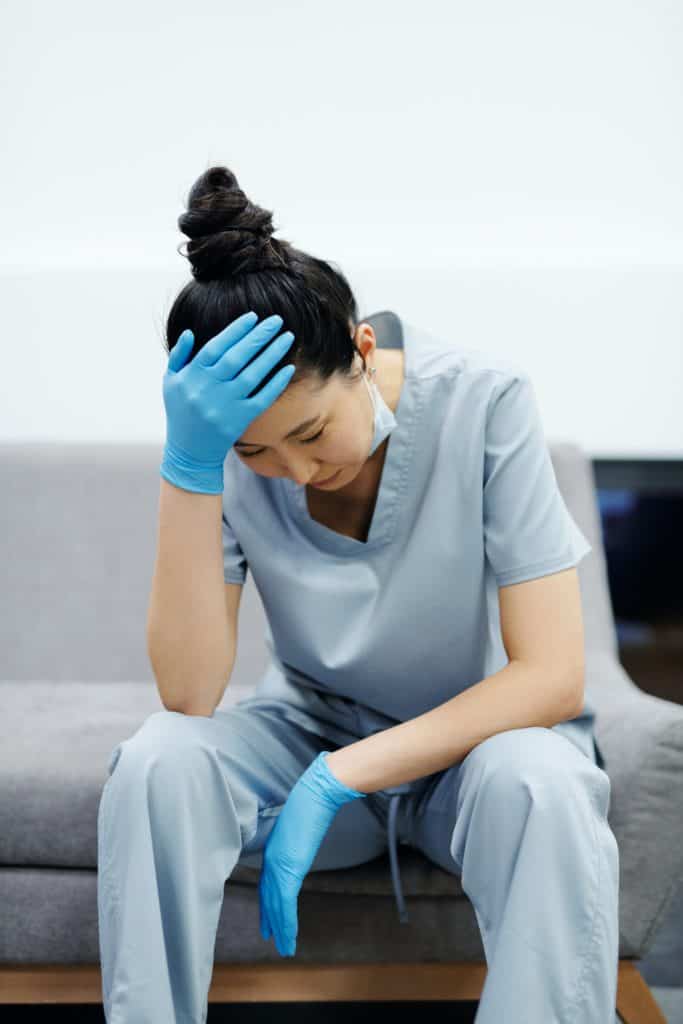
Nurses in the United States experience three times the amount of workplace injuries compared to other workers.
Why?
Primary reasons include overexertion, push, pull, strain from physically demanding tasks, slips and falls, and being struck by an object.
In 2019, nursing injuries statistics show hospital and nursing facility workers in Pennsylvania reported over 24,000 work-related nursing injuries1. Daily work-life for many nurses, like Registered Nurses (RN), Certified Nursing Assistants (CNA), and Licensed Practical Nurses (LPN), includes grueling work schedules, understaffed facilities especially in nursing homes, and emotionally draining day-to-day responsibilities which can result in nursing injuries on the job.
Overexertion is the number one cause of nursing and hospital staff injuries in Pennsylvania1. Sprains are the most common workplace injuries for hospital and nursing staff, accounting for 40.7% of nursing injuries[1]. Nursing responsibilities are physically demanding. Nurses routinely lift patients and handle heavy equipment. Additionally, they often work long hours. This further increases the likelihood of injury since it is common to be both physically and emotionally drained at times during shifts.
The conventional injury from overexertion is a muscle strain or tear can occur. This can occur from pushing, pulling, lifting etc.… It is also commonplace to see nursing back injuries including herniated disks among nursing professionals. Female nurses in particular have a greater risk of incurring an overexertion workplace injury.
In addition to physical overexertion, a routine of punishing work schedules, little sleep, and emotionally draining days can cause mental and emotional fatigue and can increase ones’ chances of sustaining a physical injury.
RN’s, CNA’s, LPN’s, and other hospital staff must routinely act promptly, oftentimes quickly going to their posts and rapidly performing patient-care tasks. Liquids such as medical solutions and bodily fluids create unsteady surfaces. Slips and falls are typical. Medical equipment and other objects are also be tripping hazards. Falls can cause foot, ankle, knee, hand, and arm injuries. These injuries can range from sprains to more severe injuries, such as broken bones or torn ligaments, and can lead to days lost from work. Loss of income and medical expenses from slip and fall injuries is a real concern among nurses, aides and assistants.
Hospitals and nursing homes can be dangerous settings. Even when safety procedures are in place and caution is taken, accidents happen. Working in patient care presents unique risks. Being struck by a patient or stuck by a needle are just two examples. The latter is prevalent. According to the American Nursing Association, more than fifty percent of nurses report being stuck by a needle. In severe cases, being pricked by a used needle can result in infections and diseases. Needle sticks should not be taken lightly.
As we discussed, hospital and nursing injuries range from sprained ankles to pulled backs to acquiring an infectious disease. Nurses and other healthcare professionals are covered by workers’ compensation laws in Pennsylvania. Workers' Compensation for nurses can cover medical expenses and lost wages. Cases can become complicated. It is important to engage an experienced legal team to help you. If you or a loved one were injured while working in healthcare, contact Dugan & Associates. Click here Contact us or call us at 412-353-3572. We will work hard for you, pursuing fair and just compensation and getting you the treatment you or your loved one deserve.
"*" indicates required fields